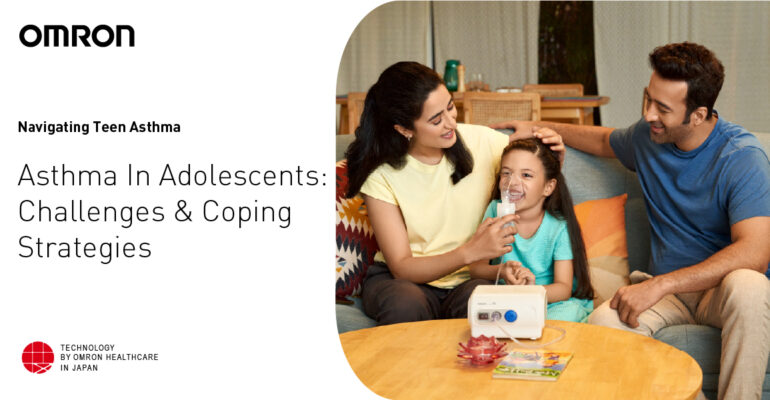Asthma In Adolescents: Challenges And Coping Strategies
January 15, 2023 2023-09-15 17:25Asthma In Adolescents: Challenges And Coping Strategies

Asthma In Adolescents: Challenges And Coping Strategies
Millions of adolescents suffer from asthma all over the world. As it is one of the most common and well-known respiratory conditions, it is understandable that young adults and adolescents face several challenges because of it. These challenges often result in the disruption of daily life and activities. As a result, being able to manage asthma and having coping techniques to face such obstacles is critical.
The following are some of the most typical obstacles that teenagers with asthma confront, as well as their associated coping strategies:
Stigma:
An aspect that many fail to consider about asthma in young adults and adolescents is the stigma that they often feel or experience. Some adolescents with asthma may feel stigmatized by their condition, particularly if they need to use inhalers or avoid certain activities. Young adolescents frequently lose confidence because of feeling left out or being unable to participate in strenuous activities. As a result of their condition, some young people may be shunned by their peers.[1]
Coping strategy: To eliminate stigma and promote understanding, the greatest coping method for such a situation is to educate classmates and teachers about asthma. Furthermore, encouraging teenagers with asthma to have a more positive self-image despite their condition will help them overcome any stigma they may feel.
Medication adherence:
Adhering to prescribed medication is a must when it comes to addressing asthma. Adolescents may forget to take their asthma medication or resist taking it due to side effects. This can result in the aggravation of their condition, causing greater discomfort and difficulty in breathing.
Coping strategy: One of the most effective ways to overcome this challenge is to develop a routine for taking medication. Involving affected kids in the formulation and maintenance of their own treatment plan can also help establish a good and attentive attitude toward medication adherence. Using respiratory aids like portable nebulizers help in maintaining of adherence to medication.[2]
Exercise limitations:
Often, exercise can prompt asthma to kick in which can cause additional discomfort and discourage affected teenagers and adolescents from any form of manual work. Exercise-induced asthma can limit adolescents’ ability to participate in sports or other physical activities which can adversely affect their overall performance in life.
Coping strategy: Working with healthcare providers to develop an asthma action plan that includes medication before exercise, warm-up, and cool-down can help prevent any exercise induced asthma attacks. This enables for the continuation of light physical activity and exercise, which can aid in healthier breathing.
Peer pressure:
As impressionable individuals, adolescents with asthma may feel peer pressure to smoke or vape. A want to connect with others of the same and a pressure to be accepted and be “normal” by others can also cause adolescents with asthma to pick up harmful habits early which will only aggravate their condition.
Coping strategy: Educate adolescents about the risks of smoking and vaping and encourage healthy behaviours.
Emotional distress:
Being unable to breathe might naturally induce emotional anguish. Adolescents with asthma may experience anxiety or depression related to their condition. When suffering an asthma episode, teenagers frequently panic.[3]
Coping strategy: The best coping strategy for such cases is to seek professional support. Getting help from a professional like therapists and nurses can help adolescents overcome their anxiety and depression, while also teaching them to remain calm and composed when panicking.
School attendance:
Asthma symptoms may cause mental block or fatigue which can be seen to affect teenagers’ desire to attend school. Adolescents can be more prone to miss school or struggle academically when suffering from inhibiting conditions like asthma and COPD. Asthmatic children are more likely to drop out of school before the age of 16 and to drop out of college or university.[4]
Coping strategy: Creating a plan alongside the teachers and school staff for the addressing and management of asthma symptoms can help establish confidence and security in the minds of young children, leading to the minimization of disruption to academic performance.
By addressing these challenges and developing coping strategies, adolescents with asthma can improve their quality of life and manage their condition effectively. A multidisciplinary approach that includes healthcare providers, educators, and mental health providers can be effective in supporting adolescents with asthma.
References:
- https://www.ncbi.nlm.nih.gov/pmc/articles/PMC8571974/
- https://www.omronbrandshop.com/product/nebulizer/ne-u100/
- https://www.ncbi.nlm.nih.gov/pmc/articles/PMC8502834/#:~:text=Asthma%20is%20a%20prominent%20airway%20condition%20that%20affects,people%20who%20do%20not%20have%20asthma%20while%20developing.
- Children with asthma may lag at school, opt for non-manual jobs | Health – Hindustan Times






